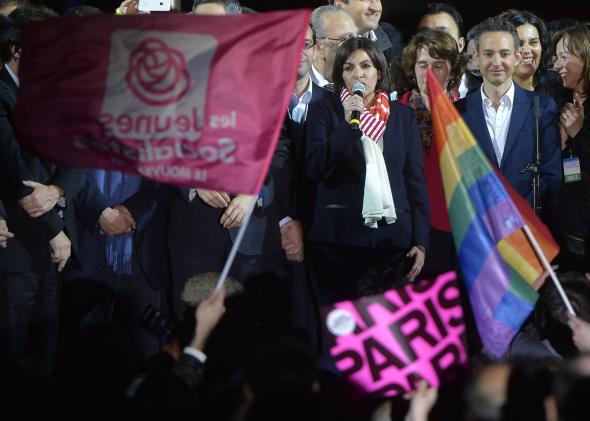Three weeks ago, I predicted that the conflict over gay marriage, which played out in France last year, might save the ruling Socialist Party from humiliation—at least in Paris—in the two rounds of municipal elections that concluded yesterday. As expected, the Socialists and their allies took a major thumping. Yesterday’s second round saw the opposition UMP and its allies take control of dozens of cities that had been ruled by the left, many for decades. In an ocean of bad news for President François Hollande, keeping Paris City Hall in the hands of the Socialist Party was a rare island of relief, one that can be tied to Hollande’s reluctant decision to follow through on his party’s longstanding promise to enact marriage equality.
In past elections, the presence of the far-right National Front in the second round of voting had siphoned off votes from the “respectable right,” allowing the Socialist Party to retain a relative majority and the bonus seats that come with it in many cities. This time, the unpopularity of the left was such that even in the presence of the National Front, Socialists and their allies lost big. The National Front gained control of a dozen cities, allowing the more than 1,200 of its members elected to municipal councils to gain valuable experience for future elections and credibility as managers of municipalities.
In this context, the victory in Paris of the Socialist Party’s Anne Hidalgo is all the more striking. Her lists won a majority of seats in the Paris city council that was barely smaller than that of outgoing mayor Bertrand Delanoë, her political mentor. And while Paris’ mayor is no longer a gay man, four of its 20 arrondissements now have out gay mayors.
For Nathalie Kosciusko-Morizet, known universally as NKM, the leader of the UMP and its center-right allies, the first round and its aftermath demonstrated the weaknesses of the right in a capital city where “bobos” are a key constituency in the swing arrondissements. NKM held a slight advantage in overall vote totals in the first round of voting on March 23, a paradoxical sign of weakness for the citywide campaign, with the “barons” of the traditional right winning landslide votes in conservative arrondissements, giving them the upper hand against the more modern and progressive NKM.
Emblematic of the old guard were candidates such as François Lebel and Franck Margain, among the strongest opponents to marriage equality. LGBTQ voters in Paris don’t make majorities, but those sensitive to homophobia do, and there were enough of them in key arrondissements to ensure a comfortable victory for Hidalgo.
Elsewhere, the most notable gay-related story in the elections was the first-round victory of Steeve Briois in Hénin-Beaumont. This impoverished town in northern France has for many years been a center of National Front success, with Briois narrowly losing in the second round of the 2009 municipal elections. This time, he won a majority in the first round, boosting the career of Briois, the general secretary of the generally homophobic National Front.
As the campaign began last year, Briois was outed as gay in a book about the National Front presence in Hénin-Beaumont. Briois and another gay member of the party asked the courts to order the publisher to withdraw the book from sale. In the end, the courts allowed the book to be sold under the condition that the other gay man’s name be removed. But they determined that Briois was a public figure of sufficient note, and the issue of homosexuality sufficiently significant for his party, to justify this “violation” of his private life, which is generally well protected by the French justice system.
Although Briois has never confirmed his sexual orientation, it’s already causing him some trouble as a mayor. When asked whether he would perform same-sex marriage ceremonies, he said that he would not and would instead ask a deputy mayor to do so. But, contrary to the official party line, he has also stated that there was no reason not to respect the law, and he hasn’t made a clear statement about whether he supports the party’s position that marriage equality should simply be scrapped.
Bertrand Delanoë claims to be retiring from politics, but with a Cabinet shake-up expected as soon as Monday, some commentators expect Delanoë, an out gay man who had previously refused a Cabinet appointment, to be named a government minister, with some pundits even claiming he’s in the running for the position of prime minister. Some will see that as his reward for saving gay-friendly Paris from the right.
